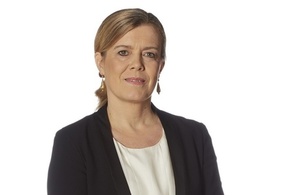Police outside Birmingham prison after a disturbance. The prison inspectorate said the privately run prison was in an ‘appalling state’ in a damning report in August.
The last couple of months have been a crucial time for the prison system. The mass walkout by prison officers in England and Wales a fortnight ago, which was quickly called off by the Prison Officers Association after talks with the prisons minister Rory Stewart, was just one cause for serious concern.
Sparked by worries about conditions, including violence, the action came hard on the heels of a damning report from the prison inspectorate into the privately run Birmingham prison in August, which concluded that it was in “an appalling state” and had met just 14 of the 70 recommendations made 18 months earlier.
Describing a proliferation of violence, filth and drugs the chief inspector, Peter Clarke, wrote that the prison had undergone a “dramatic deterioration”. It was “in a state of crisis that is remarkable even by the low standards we have seen all-too-frequently in recent years.” The government made the right move in swiftly taking the Birmingham jail under emergency control of the Ministry of Justice (MoJ) after the inspectorate concluded it wasn’t confident the controversial private security firm G4S could turn the situation around. Especially since Birmingham has had a difficult history, including the serious riots in 2016.
Privatisation in parts of the prison estate has spawned problems, including persistently low staff-to-inmate ratios and high turnover of prison officers. However, as the Prison Governors Association points out, there are much bigger systemic issues at play across the sector, not least the damaging impact of austerity: prisons “cannot be run on the cheap”, it says.
The MoJ insists the government is committed to improving the situation and the justice secretary, David Gauke, did promise to improve conditions, prison officer training and recruitment. But the government’s proposals do not go far enough to reduce the spiralling levels of violence and overcrowding, self-harm and deaths in custody. And, as if there wasn’t enough to contend with, reports last week that the prisons service chief, Michael Spurr, was told to step down, merely adds to the sense of crisis.
The strike was about much more than a list of demands, however. While the walkout in Britain was by officers and the action in the other by inmates, both highlight broader concerns with criminal justice. “It’s a human rights issue,” Lawyers Speak, an organisation that represented the imprisoned activists.
“Every day prisoners are harmed due to conditions of confinement. For some of us it’s as if we are already dead. So, what do we have to lose?”
Colleen Hackett, a member of the Incarcerated Workers Organising Committee, says a core thread of the strike has been “the assertion of humanity”.
The strikes in the UK pose a larger question: how do we persuade people to care about the treatment and conditions of prisoners when there are so many other challenging issues? According to the frequently criticised by human rights activists for excessive use of solitary confinement and for using prison as a de-facto and wildly ill-equipped substitute for adequate mental healthcare.
Whatever the outcome , those behind it are spot on – when we dehumanise prisoners, it demeans us all.
Write to the David Gauke justice Minister that"enough is enough !
Question:
How we can
get the government to publish a green paper on converting currently serving IPP
prisoners.
As I have read a Green Paper is a Government publication that details specific issues,
and then points out possible courses of action in terms of policy and
legislation. Commissioned from the relevant department if the Government feels
that there is an area where new legislation is required, or existing
legislation needs to be re-vamped. Green Paper contains no commitment to
action, it is more a tool of stimulating discussion, but it is often the first
step towards changing the law. After publication, the suggestions contained in
the paper will be up for public consultation and debate. The Government will
talk to citizens, to find out what they think.
These discussions will then feed into the next stage of the process –
the production of a White Paper. White Papers are issued by the Government as
statements of policy, and often set out proposals for legislative changes or
the introduction of new laws. Proposals often emerge from a Green Paper
process. Some White Papers may invite comments, and their contents may be debated
before a bill is produced. The bill is then debated in the House of Commons
and, subject to amendments and approval, will eventually pass into law.
The government should be seen to engage with people to raise awareness
of the challenges IPP prisoners are facing before publication, so that any
document would accurately reflect the thoughts and feelings of as many people
as possible.
The government should be looking at people's opinions about the
important system change should be based on". Write to your MP’s
Question:
I was reading something and thought to share it with you, in crown RV Roberts (2016) lord Thomas said that the parliament could introduce a new law to convert IPP sentences into extended sentences and that will not be in proper in anyway what can we do as IPP families to convince parliament to introduce a new law that convert IPP to extended sentences. Extended sentences are for dangerous offenders surely an IPP could be managed on extended sentence rather than trying to get release from the parole board.
Regarding converting IPP to extended sentences the justice Minister David Gauke has the power to change the situation so perhaps we should be asking the justice Minister questions such as “why not and get definitive answer as the current situation is acceptable?
Prison Service chief Michael Spurr told to step down
Spurr has faced criticism over crisis in jails but campaigners say ministers are to blame
The head of the prison service, Michael Spurr, has been told to step down from the role amid an ongoing crisis in jails in England and Wales.
Although Spurr will remain chief executive of HM Prisons and Probation Service until the end of March next year, the Guardian understands he was told by the Ministry of Justice’s permanent secretary, Richard Heaton, he had to go.
A source said: “He’s not been without his critics. A change of direction was needed.”
However, prison reform campaigners praised Spurr’s efforts and said ministers were “deluding themselves” if they thought a change of leader would fix overcrowded and under-resourced prisons.
And former Labour justice secretary, Charlie Falconer, said Spurr had been “dealt as shitty a hand by the government as it is possible to deal”.
The announcement of his departure comes after a series of damning prison inspections. Spurr, who has been with the prison service for 35 years, including nine years leading it, has faced criticism over the mounting crisis, with the parliament’s justice committee attacking his “lack of leadership”.
He joined the service as a prison officer in 1983 before working his way up through a series of posts as a governor and then becoming head of the service.
Peter Dawson, director of the Prison Reform Trust, said: “Michael Spurr will be an extraordinarily hard act to follow. He is an exceptionally principled and knowledgeable leader who has selflessly served an endless succession of short-term ministers.
“Whoever takes over will face the same fundamental problems of overcrowded and under -resourced prisons. Those are problems which only ministers can address and none of those whom Michael has served so faithfully have delivered. Anyone who thinks the problems in our prisons can be solved by a change of leader is deluding themselves.” Continued https://www.theguardian.com/society/2018/sep/20/prison-service-chief-michael-spurr-told-to-step-down.
Nothing is being done urgently should David Gauke justice Minister step down to finally end the misery ?
Nothing is being done urgently should David Gauke justice Minister step down to finally end the misery ?
How to start your youtube channel be the voice for IPP prisoners also a great place to add links to your website and other social media networks
Search Results
Featured snippet from the web
Start with the basics
- Sign into YouTube and click on the user icon at the top right of the screen.
- Click on the gear icon to get to your account's YouTube Settings.
- Click on Create a new channel.
- Then choose “Use name”
- Add your Brand name and click create.
https://support.google.com/youtube/answer/1646861?hl=en
Comments
Respect for him highlighting the plight of the vulnerable.
Very important issue that people should be made more aware of. Big up COE for this
Anthony Hardy1 day ago
Respect for him highlighting the plight of the vulnerable.
Very important issue that people should be made more aware of. Big up COE for this




